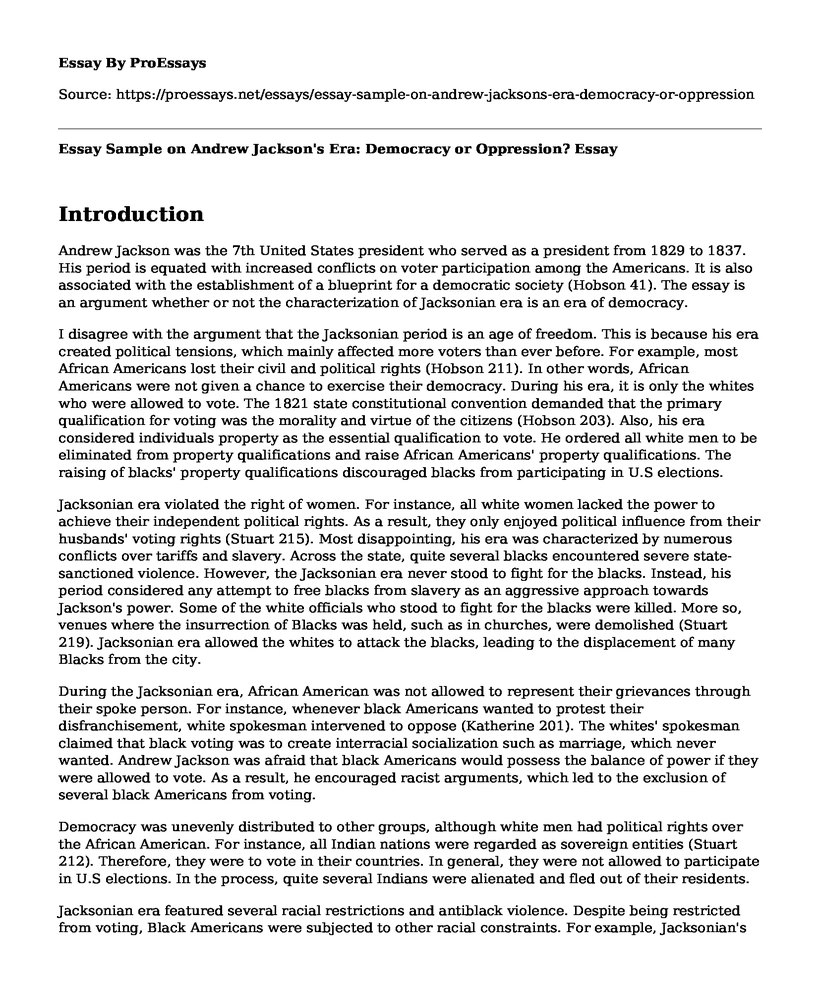Introduction
Andrew Jackson was the 7th United States president who served as a president from 1829 to 1837. His period is equated with increased conflicts on voter participation among the Americans. It is also associated with the establishment of a blueprint for a democratic society (Hobson 41). The essay is an argument whether or not the characterization of Jacksonian era is an era of democracy.
I disagree with the argument that the Jacksonian period is an age of freedom. This is because his era created political tensions, which mainly affected more voters than ever before. For example, most African Americans lost their civil and political rights (Hobson 211). In other words, African Americans were not given a chance to exercise their democracy. During his era, it is only the whites who were allowed to vote. The 1821 state constitutional convention demanded that the primary qualification for voting was the morality and virtue of the citizens (Hobson 203). Also, his era considered individuals property as the essential qualification to vote. He ordered all white men to be eliminated from property qualifications and raise African Americans' property qualifications. The raising of blacks' property qualifications discouraged blacks from participating in U.S elections.
Jacksonian era violated the right of women. For instance, all white women lacked the power to achieve their independent political rights. As a result, they only enjoyed political influence from their husbands' voting rights (Stuart 215). Most disappointing, his era was characterized by numerous conflicts over tariffs and slavery. Across the state, quite several blacks encountered severe state-sanctioned violence. However, the Jacksonian era never stood to fight for the blacks. Instead, his period considered any attempt to free blacks from slavery as an aggressive approach towards Jackson's power. Some of the white officials who stood to fight for the blacks were killed. More so, venues where the insurrection of Blacks was held, such as in churches, were demolished (Stuart 219). Jacksonian era allowed the whites to attack the blacks, leading to the displacement of many Blacks from the city.
During the Jacksonian era, African American was not allowed to represent their grievances through their spoke person. For instance, whenever black Americans wanted to protest their disfranchisement, white spokesman intervened to oppose (Katherine 201). The whites' spokesman claimed that black voting was to create interracial socialization such as marriage, which never wanted. Andrew Jackson was afraid that black Americans would possess the balance of power if they were allowed to vote. As a result, he encouraged racist arguments, which led to the exclusion of several black Americans from voting.
Democracy was unevenly distributed to other groups, although white men had political rights over the African American. For instance, all Indian nations were regarded as sovereign entities (Stuart 212). Therefore, they were to vote in their countries. In general, they were not allowed to participate in U.S elections. In the process, quite several Indians were alienated and fled out of their residents.
Jacksonian era featured several racial restrictions and antiblack violence. Despite being restricted from voting, Black Americans were subjected to other racial constraints. For example, Jacksonian's congress limited blacks from the rights of naturalization (Stuart 219). In other words, no Black American would acquire American citizenship by naturalization. The congress also banned Blacks from registering themselves into federal militias. In the process, the congress ordered all officials to exercise a separate legal code to control the blacks (Katherine 184). The adopted federal legislation restricted Black Americans from accessing various essential state services. Black Americans were segregated from public schools, transportation, and denied accommodation in any of the state's houses.
Conclusion
In conclusion, the Jacksonian era should not be considered as an era of democracy. Most of the practices that took place during Jacksonian reign were against the rights of many Americans. For example, Black Americans and Indians were denied the right to exercise their political concerns. It's only the white men who were allowed to vote. Women were not considered necessary in any measure. Therefore, they only enjoyed the gains acquired by their husbands.
Works Cited
Hobson P. Christopher. "The limits of liberal-democracy promotion." Alternatives 34.4 (2017): 383-405.www.journals.sagepub.com/doi/abs/10.1177/030437540903400402
Katherine W. Stuart. "The culture of poplars in Eastern North America." The culture of poplars in eastern North America. (2018). 170-209.www.cabdirect.org/cabdirect/abstract/19840697884
Stuart M. Blumin. "Limits of political engagement in antebellum America: A new look at the golden age of participatory democracy." The Journal of American History 84.3 (2018): 855-855.www.academic.oup.com/jah/article-abstract/84/3/855/767816
Cite this page
Essay Sample on Andrew Jackson's Era: Democracy or Oppression?. (2023, Mar 13). Retrieved from https://proessays.net/essays/essay-sample-on-andrew-jacksons-era-democracy-or-oppression
If you are the original author of this essay and no longer wish to have it published on the ProEssays website, please click below to request its removal:
- The Indian Act and the Status System Essay Example
- Essay Example on Egypt Uprising Aftermath: Protests Over Gov't Failure to Protect Minorities
- NY Gov Cuomo Unveils New Healthcare Access Program - Essay Sample
- Essay Sample on Occupy Wall Street: Protesting Inequality and Lack of Democracy
- Essay Example on Current US GDP & Federal Debt: 85.91 Trillion & ~23.17 Trillion Respectively
- Paper Example on COVID-19 Pandemic: Examining National Policies in America
- Planning Intervention for Hunger Concern in Cuyahoga County - Paper Example







